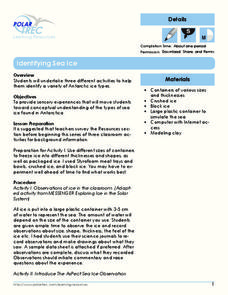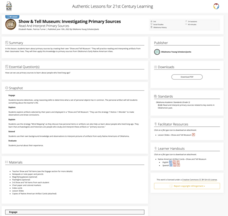Curated OER
Becoming a "Seer" -- The Observation of Place
Students discover that effective observations can help their writing. They realize their sense of place and how they view the world around them. They write about their place and share with the class.
Curated OER
Observation Journal
In this ocean life learning exercise, students observe the plants, animals, human activity, park rules/local laws, at a specific location. Students also observe any activity in neighborhoods, the water sources for the area, the water...
Curated OER
Observing The Sky
In this space science instructional activity, learners find the words that are related to the observations made of constellations and other related puzzles.
Curated OER
Watch the Sky: Observing Clouds and Patterns
Students observe clouds outside of the classroom. In this weather activity, students investigate and record the clouds above their classroom everyday for three weeks. The students then analyze their data and discuss what causes specific...
American Chemical Society
Combustion and Burning
On Earth, a candle flame points up, but on the International Space Station, it forms a sphere. Young scientists practice their skills by recording observations before, during, and after a candle burns. Chemical and physical changes...
Polar Trec
Identifying Sea Ice
Sea ice contains 17 sub-types based on age and various characteristics. Scholars observe ice floating in a simulated ocean and record their observations. Then, they view photographs of different types of sea ice and learn to...
Curated OER
Beneficial Bug Scavenger Hunt
Going on a scavenger hunt sounds like a great way to spice up any lesson plan. To better understand how beneficial insects are, the class goes outdoors to search for and observe a bug that has big benefits. Included in the lesson are...
PBS
Season Seeking
It's a time of change. A hands-on activity engages young scientists in a lesson highlighting the change of seasons. They brainstorm indicators of season changes in nature and then look for them. Next, they record observations in a field...
Curated OER
Mealworms
Crawl into the world of the darkling beetle with this scientific investigation. Watch as the insects move through the larval, pupal, and adult stages of life, recording observations along the way. Discuss the necessities of life as young...
University of Kentucky
The Great Spider Debate
Poor, misunderstood spiders! They are feared, disrespected, and detested by many people, yet they do so many positive things. A great addition to any insect unit, learn about some of the more common spiders, while hopefully dispelling...
PBS
Cloud Clues
It's cloudy with a good chance of learning! An inquiry-based lesson begins with an exploration of transparent, translucent, and opaque materials. Young scientists then connect their learning to the different cloud types as they take the...
Workforce Solutions
Speed Interviewing
An important part of the job search process is the personal interview. Help pupils prepare with speed interviewing activity—teams of three-act as a job seeker, interviewer, and observer. Every three minutes, participants rotate roles and...
Curated OER
Picture This
A unique writing lesson, this plan begins with learners talking about multiculturalism in small groups. Each learner will choose a picture from a newspaper, describe it to their small group, and think about how it relates to...
Curated OER
Are You Aware?
Bring the five senses to life with a fun science experiment! Kindergartners and first graders read an explanation of the five senses, then identify which items Sophia can sense if she is blindfolded. A science explanation at the bottom...
Curated OER
Being Shadowed
What causes a shadow to appear? Have kindergartners and first graders explore shadows with a fun science activity. After reading a short paragraph about light sources, they draw a shadow for a little girl based on the location of the...
Curriculum Corner
I See a School
Give observational and writing skills a boost with a worksheet that takes scholars on a sight-seeing journey around the school. Learners read sentences and color a corresponding picture, then write their own observational sentence and...
Journey Through the Universe
Going through a Phase
Ignore the full moon, it's just a phase. Young scholars observe and record the moon during a full cycle before learning to predict future phases. Then the instructor leads a discussion on the other solar system objects that also go...
Santa Monica College
Flame Tests of Metal Cations
Scientists used flame tests to identify elements long before the invention of emission spectroscopy. Young chemists observe a flame test of five metal cations in the fourth instructional activity of an 11-part series. Individuals then...
K20 LEARN
Show and Tell Museum - Investigating Primary Sources: Read and Interpret Primary Sources
Scholars become detectives in a instructional activity that focuses on primary sources. Learners practice their observational skills by examining the teacher's artifact and visiting the Show and Tell Museum that highlihgts items from...
Academy of American Poets
Teach This Poem: “Crisscross” by Arthur Sze
Arthur Sze's poem "Crisscross" launches a instructional activity that asks scholars to use their observation skills. They first draw an image that reflects what crisscross means to them. They then examine a photograph of a lightning...
Curated OER
Exploring Seasonal Shadows and Sunlight
What can shadows tell us about the changing season? Over several months, astronomy learners record length and position of an outdoor object's shadow, such as a flagpole. They apply the data to a growing hypothesis and note the patterns...
Curated OER
Layer Cake Archaeology
Excavating cake? Why not! Kids spoon into some layers and artifacts during this tasty hands-on activity. The cake, a simulated archaeological dig, is the object of observation and discussion.
National Park Service
Glaciers and Water
Explore the amazing power of glaciers with a hands-on earth science experiment! After first learning basic background information, learners go on to create their very own chunks of frozen water and gravel in order to observe first-hand...
PBS
The Butterfly or Adult
Now that your class knows about the life cycle of a butterfly, it's time to discuss how an adult butterfly survives in the wild. The class diagrams and labels the parts of a butterfly, discusses how butterflies survive, and then make a...
Other popular searches
- Observation and Inferences
- Observation Skills
- Student Teacher Observation
- Observation Inference
- Making Observations
- Scientific Observation
- Inference and Observation
- Observation Log
- Weather Observation Chart
- Observations and Inferences
- Direct Observation
- Science Observation Skills

























